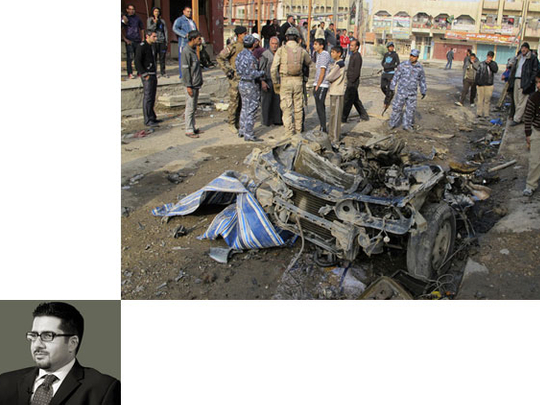
And so the last of the American troops have left Iraq, marking the end of a campaign which has lasted nine bloody years. What started as a hyped-up war of ‘shock and awe', has ended rather quietly, tainted with mixed reviews as to whether or not the ‘mission' was indeed accomplished. One has to wonder what the mission was anyway. This is not to cry over spilt milk, but for everyone's sake, there must be a serious reassessment of the war, its causes and outcomes.
As it turned out, the Weapons of Mass Destruction (WMDs) that the former American administration was led to believe, or pretended to believe, existed in Iraq, never did. One must now ask why this bogey was raised? Who were the beneficiaries?
There was another argument at some point that the Iraqi regime had links with Al Qaida; the case was so idiotic that one American cartoonist ridiculed it by showing that the only ‘link' former president George W. Bush found was by circling the letter ‘Q' in both words (Iraq and Al Qaida). Over the years, the war itself and later the occupation, were harshly criticised for actually creating a breeding-ground for fundamentalist groups in Iraq.
As for bringing freedom and democracy to the Iraqi people, I suppose very few people can argue against the fact that Saddam Hussain was a brutal dictator. However, the outcome of the Arab Spring confirms that democracy may very well happen organically, but it can never be imposed by the use of force.
Let us not forget that by 2003, the Iraqi regime was ailing due to the combination of wars and sanctions which had left it a shadow of its former self.
Why didn't Bush adopt the model of intervention used recently in Libya? Not that the Nato-led campaign was flawless or interest-free. The West still has to answer to critics wondering why it didn't interfere in Syria or Yemen in the same way and whether or not oil (which Libya, as Iraq was, happens to be particularly rich in) was a factor.
Nevertheless, if one compares the end results so far, the intervention model followed in Libya would definitely emerge as the lesser of two evils.
Could it not have occurred to Bush at the time that perhaps taking a unilateral decision wasn't a wise thing to do? That he could have secured the backing of both the Arab and international community first? That America could have continued supporting the Iraqi opposition and even perhaps provide them with a military cover, without having to invade the country?
The list of American blunders in Iraq is both appalling and endless. Why on earth was the Iraqi army dissolved following the collapse of the regime? Did it not occur to the Bush administration that by keeping this army intact, they could have easily maintained stability and security across the country? Did they not guess what the consequences of dismissing hundreds of thousands of professionally trained Iraqi soldiers would be? (Yes, you guessed it: they would turn to the next available employer).
Then there is the issue of reconstruction, or to be precise, the absence of any serious reconstruction efforts. Iraq isn't a poor country, it has massive oil reserves and the Americans had both the know-how and the means to have left it a better shape following their departure. Yet, the people of this country, whose lifestyle was once the envy of all their Arab neighbours, still live with power cuts, shortage of water supply and a lack of proper infrastructure.
Favour to Iran
Even if the US had intended to introduce a Marshal Plan-like initiative at one point, it would be safe to argue that it couldn't physically afford it any more with all the economic woes that Barack Obama inherited upon becoming president in 2008.
With the war costing nearly a trillion dollars, all Obama could have done at this late stage was to limit the costs and pull the plug, albeit the damage had already been done.
More importantly, 100,000 Iraqi and 4,500 American lives were lost and tens of thousands on both sides injured. Nothing can ever be done to ease the pain of those who have lost loved onesor to keep them from wondering if the sacrifices they have had to make were worth it.
Furthermore, one wonders if the world is now a safer place. Fair enough, at least now we know for sure that no WMDs will fall into the wrong hands and that Saddam isn't around any more to conquer another country. However, what about the elephant that has now found its way into the room?
I am, of course, referring to Iran, the true and only winner of this war. It is almost impossible that US policy-makers have not yet realised that by intentionally or unintentionally destabilising Iraq, they have just done Tehran the biggest favour possible. The bottom line is that the Iranians must be saying "with enemies like America, who needs friends?"
Faisal J. Abbas is a London-based journalist, blogger and social commentator.









